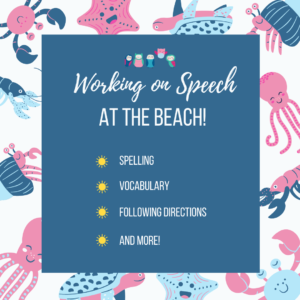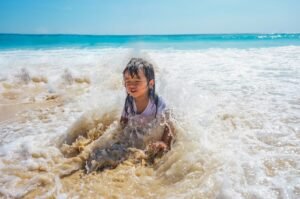Heading to the beach this summer? With all the summer travel to the coast, today’s blog post will feature activities that promote speech and language skills on vacation. Research continues to show the importance of learning and gaining experiences through play. The beach offers a wide variety of experiences for children, as it is filled with endless sensory and play opportunities. Scroll for more!

Before the trip:
While planning for the trip… make some lists! Lists are an excellent way to work on summer vocabulary, recall, and executive functioning skills, like organization.
List idea #1: Packing list
-
Children can write down items needed for the trip, such as clothing, swimming accessories, sunglasses, and more.
-
Don’t forget to include beach toys, such as beach balls or buckets and shovels!
List idea #2: Snacks/Items for car
-
Children can write down snacks and games they would like for the car. Have them pack their desired items and cross them off the list.
-
Some excellent car travel games: Headbanz, Uno, Tic Tac Toe, Sticker Books, Spot It!, or Mad Libs. Don’t forget the summer reading books, too!
List idea #3: Wish list
-
Children can make a “wish list” of all the activities they want to do at the beach. Creating this list not only provides language opportunities, but helps the child communicate things that are important to them and manage expectations for the trip!

Making the trip:
Safe travels! Whether traveling by plane, train, or car, here are some excellent speech and language experiences during the trip:
Pack a lunch for the travels! Children can help create their favorite sandwiches for the drive. While enjoying their sandwich, have them describe what’s in it or retell how they made it!
Play fun games filled with language skills. Word games can encourage skills such as turn-taking, descriptive language, problem solving, and more!
-
“I Spy”
-
“20” questions
-
“I’m going on a picnic…”
-
Road trip scavenger hunt

During the trip:
Let the vacation begin!
Enjoy the world’s biggest sandbox!
-
The beach offers a variety of sensory experiences. Describe how the sand and water feel using adjectives! Cold, slimy, soft, hot, etc.
-
Talk about all of the things the child or others are doing on the beach. Use verbs like dig, scoop, ride, swim, jump, and more.
Spelling, letters, numbers and shapes
-
Work on copying skills. Write a word in the sand and have the child copy it.
-
Practice spelling skills. Say a word aloud and have the child write it in the sand.
-
Have an adult write letters in the sand. Practice letter recognition by having the child name the letter.
-
Construct letters in the sand with seashells, rocks, sticks or seaweed.
-
Draw different numbers and shapes in the sand. A child can use their fingers, shovels, sticks, or any other fun items they find at the beach!
-
Have an adult write a word in the sand. The child can think of words that rhyme with it!
Sound practice
-
Look for items at the beach with the child’s sound in it! For example, if working on “S”, words like “sand”, “snacks”, “sea”, or “sandals” may be named!
Build a sand castle
-
Create a sand castle. This activity can encourage following directions, flexibility, problem solving and planning, and sequencing.
Send a postcard!
-
Head to the local gift shop and pick out a post card. Practice writing and language skills by describing the trip so far and sending it to a loved one!
Seashell sorting
-
Spend a morning searching the beach for seashells. Once complete, sort the seashells into different categories, such as by color or size. Everyone can pick out their favorite and share why they love it!
Little learners:
-
Rolling a ball or popping bubbles are excellent ways to work on turn-taking skills with little ones.
-
By 2-3 years of age, the following sounds are expected to be mastered: /p, b, m, t, d, n, h, k, g, w, ng, f, y/. Encourage these sounds with some of the following beach vocabulary words: ball, water, walk, wet, waves, hot, cold, boat, or play.
Beach balls!
-
Toss a beach ball and discuss where it lands using prepositions. For example, “The beach ball landed on the towel” or “The beach ball landed in the water”.
-
Simon Says: Using the beach ball, play a round of Simon Says on the beach, such as “Simon Says kick the ball then touch your nose!”. Simon Says is a great game to work on following directions and listening skills, as well as using verbs and basic concepts.

After the trip:
Home sweet home!
Memories
-
Have the child draw their favorite thing about the beach. Then, have them describe it aloud!
-
Make a memory book with family beach pictures. This can be used for recalling past events or telling a story from an experience!
Enjoy the warm sun and sandy shores this summer! Wishing everyone safe and wonderful vacations!
